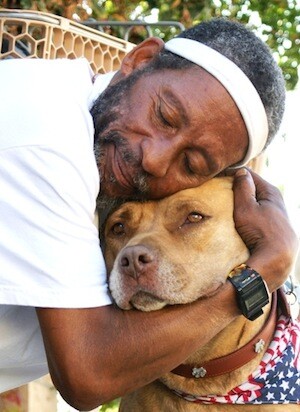In Memoriam: Michael Reed

A friend of mine died recently, a man by the name of Michael Reed. He was homeless. That wasn't the most important thing about him, but it was important to me because I frankly had never had a homeless friend until Michael. He was a real friend, a confidant and fellow traveler, not somebody I passed daily on a street corner and gave money or kind words, someone for whom I felt vague sympathy and kept a certain distance. It wasn't like that. Nor was he a journalistic subject I wrote about once and then kept in touch, just to maintain connection to a street-level source who could be useful in the future. It wasn't like that, either.
Actually it was Michael's dog, Topaz, who was the journalistic subject that I was keen on writing about after she got shot in a police crossfire in downtown Inglewood back in the summer of 2008. Topaz the pit bull had been quietly sitting tied to Michael's shopping cart when the Inglewood cops let loose a hail of 40 bullets intended for another homeless man they suspected of wielding a gun. The man was killed and Topaz was wounded in her hind leg. Inexplicably, the cops whisked her away to an animal shelter and took Michael down to the police station for questioning. By the time Michael reconnected with Topaz in the shelter system, the under-treated leg was in bad shape and had to come off. I was outraged by the death of the man -- turns out he had a toy gun -- and equally outraged that an innocent-bystander dog had to pay for such incompetence with one of her limbs. She was a victim of excessive use of force if I ever saw one.
Michael agreed. He was indignant, but he had lived such a hardscrabble life that Topaz's misfortune didn't surprise him much; ultimately, he was glad to have his beloved companion back alive. Michael was short and wiry, about my age, with graying hair and face stubble, but he was full of an energy and boundless optimism that bordered on adolescent. He had a brilliant, often mischievous smile. He experienced drinking and drug problems that had waylaid him -- "partying," he called it -- but never killed his spirit; a native Angeleno, he had grown up in the South Bay and loved to surf.
I found Michael interesting, which is why we stayed in touch. In our many conversations he admitted that he had wrought his own misery in many ways, but he also had withering critiques of American society that he said has long normalized homelessness, especially for black men like him. In our years of friendship we shared political views, a similar background -- I had also gone to public high school in the South Bay, though I never surfed -- and, not least of all, a love of dogs. We had dinners out, and when he fell sick, I helped run him to hospital appointments and shop for food because he was too weak.
I confess that I was a little uneasy about having Michael as a friend. I think I feared his homelessness reflected badly on me, or I thought his bad situation would rub off on my situation, which was professionally satisfying but, increasingly, financially tenuous. Would I become Michael? Such class consciousness is not uncommon, but among aspiring African-Americans it can border on paranoia -- to consort with black poverty and failure, the thinking goes, is to court the specter of an unfulfilled life that practically defines the ghetto or the backwoods. When a family of Section 8 renters moved onto my Inglewood block a few year ago, you would have thought Armageddon had come to south Crenshaw -- people said there goes not just the neighborhood, but the whole culture of upward mobility (that turned out not to be true). With Michael, I had a twinge of the same apprehension. He wasn't moving into my neighborhood -- he certainly couldn't afford it, or any neighborhood, for that matter -- but he was close to me in a way nobody like him had been. At moments I felt vulnerable, uncertain: Was this appropriate? What did it mean? What would this sort of friendship entail? Most paranoid: What might he want from me?
Nothing more or less than what I wanted from him, as it turned out. Thanks in part to my urging, Michael asked the city of Inglewood for some compensation for his damaged dog, which he more than deserved. He got enough money to rent a trailer in a park on the southeast end of Torrance; he and Topaz finally had a home. After Michael recovered from his illness, he recovered his spirits -- they had been at a dangerously low ebb -- and then he got a girlfriend. He seemed happy, upbeat. We drifted out of touch. I heard he was getting married. It seemed like his life was cohering in a good way, and I figured he didn't really need me anymore. He was busy, in a good sense.
Next thing I heard, he had died. His illness had not gone away, just underground for a while. I'm sorry that I didn't keep more in touch, that I assumed he had gotten to a place where he didn't need my presence; I'm afraid I've assumed that in too many friendships in my life. I doubt that he had a family who took care of his affairs, because his friends always did that. They were his family. That was the commitment I was most afraid of, but the truth is that I was already living it; shortly after we met, we were there. Michael and I lived in the same place, though both of us felt forbidden to say so. He is free of that now. So am I.